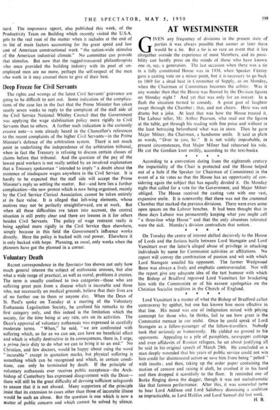Deep Freeze for Civil Servants
The rights and wrongs of the latest Civil Servants' grievance are going to be difficult to sort out. Some indication of the complica- tions of the case lies in the fact that the Prime Minister has taken nearly seven weeks to reply to the complaint of the staff side of the Civil Service National Whitley Council that the Government was applying the wage stabilisation policy more rigidly to Civil Servants than to others. A further such indication is the curiously evasive note—a note already heard in the Chancellor's references to the recent complaints of the higher Civil Servants—in the Prime Minister's defence of the arbitration system. There is not much point in underlining the independence of the arbitration tribunal, when in fact the Treasury is refusing to discuss certain classes of claims before that tribunal. And the question of the pay of the lowest paid workers is not really settled by an involved explanation that a Treasury spokesman " intended to imply " a doubt about the existence of inadequate wages anywhere in the Civil Service. It is hardly to be expected that the staff side will accept the Prime Minister's reply as settling the matter. But—and here lies a further complication—the new protest which is now being organised, mainly by the Civil Service Clerical Association, cannot be taken entirely at its face value. It is alleged that left-wing elements, whose motives may not be perfectly straightforward, are at work. But when all these difficulties are taken into account, the central situation is still pretty clear and there are lessons in it for others besides Civil Servants. The policy of wage restraint really is being applied more rigidly in the Civil Service than elsewhere, simply because in this field the Government's influence works directly. Here the policy is backed with real power. Elsewhere it is only backed with hope. Planning, as usual, only works when the planners have got the planned in a corner.






































 Previous page
Previous page